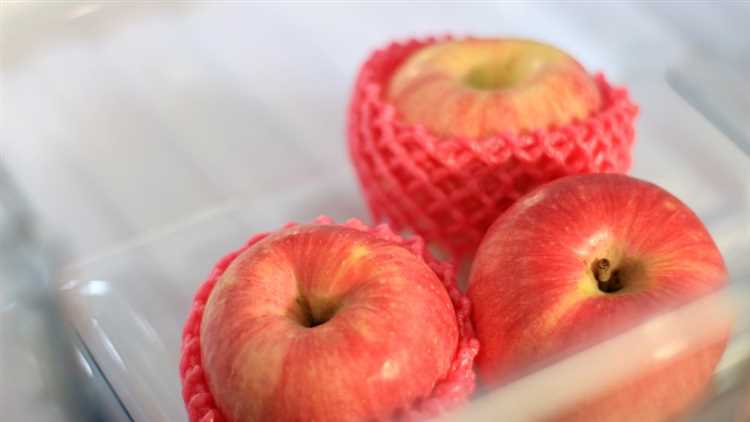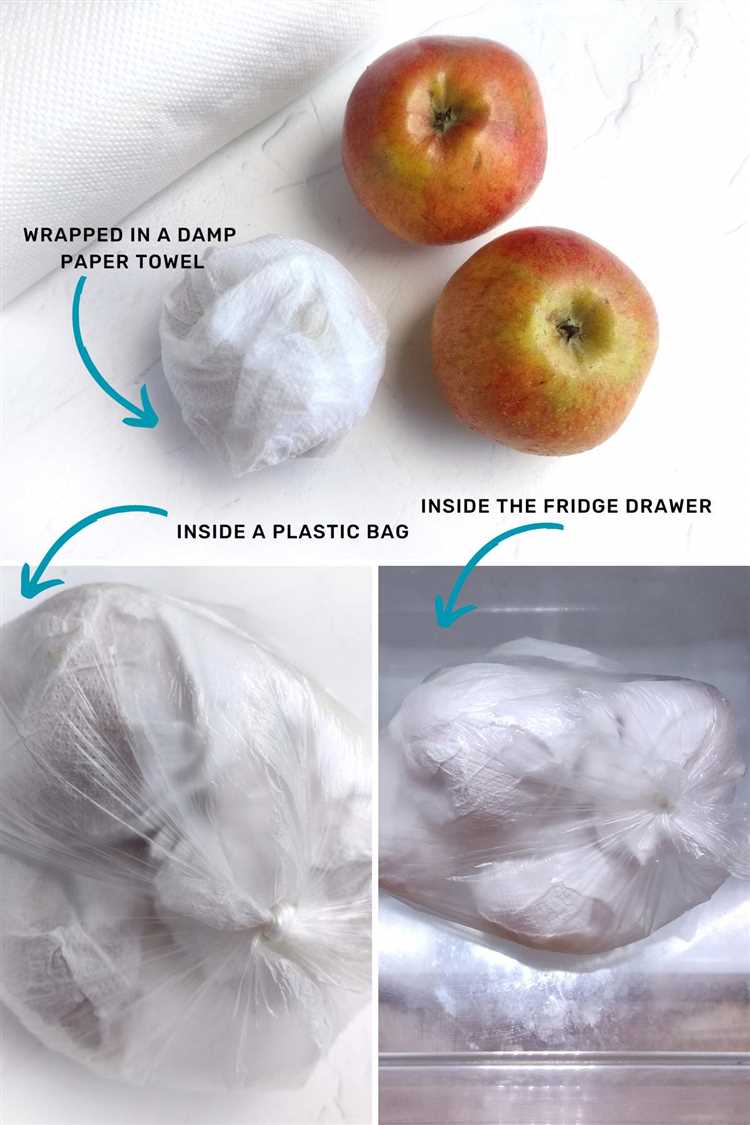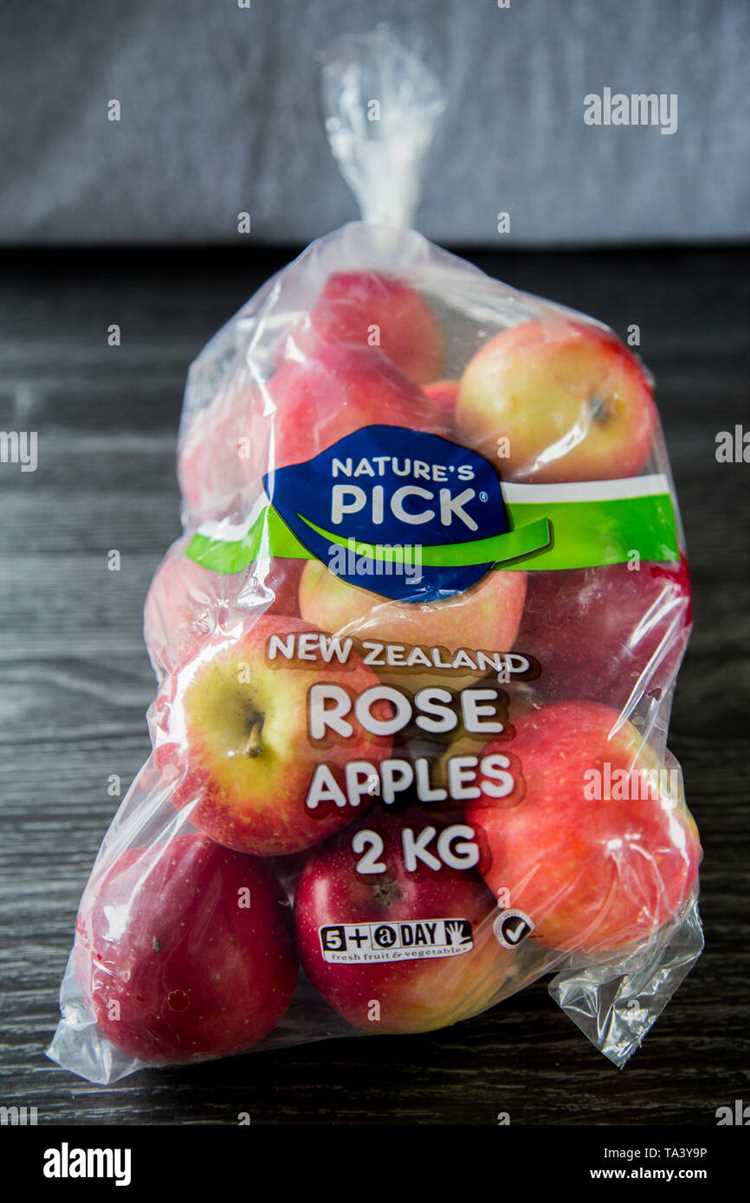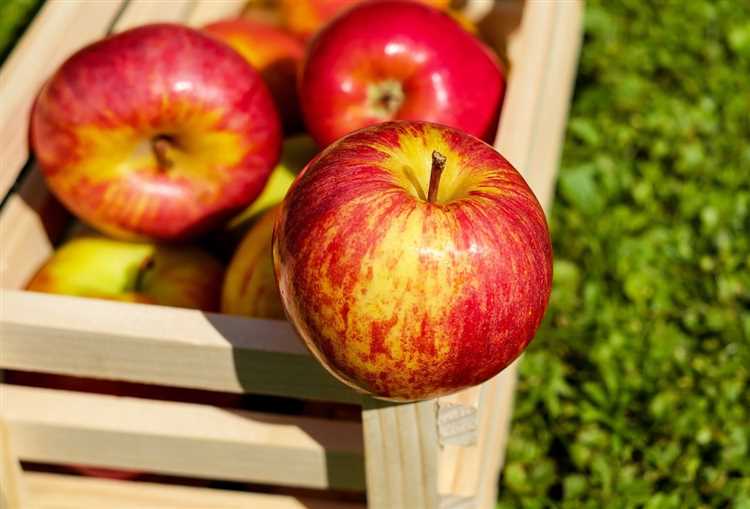
When it comes to keeping your apples fresh and delicious, proper storage is key. One simple yet effective method is storing your apples in a plastic bag. This method has numerous benefits that can help extend the lifespan of your apples and ensure they stay crispy and juicy for longer.
One of the main advantages of using a plastic bag for apple storage is that it helps to maintain the fruit’s moisture levels. Apples naturally release ethylene gas, which can promote ripening and spoilage. By storing them in a plastic bag, you can control the amount of ethylene gas that surrounds the apples, slowing down the ripening process and preventing premature spoilage.
Additionally, a plastic bag creates a barrier that helps to prevent outside moisture and air from reaching the apples. This is especially important in environments with high humidity levels, as excessive moisture can cause apples to become soft and mushy. By keeping the apples in a sealed plastic bag, you can minimize moisture exposure and maintain their crisp texture.
Furthermore, storing apples in a plastic bag can also help protect them from bruising and damage. The bag acts as a cushion, reducing the chances of the apples getting bumped or crushed. This is particularly beneficial if you often transport apples or if you have a busy kitchen where the fruit is at risk of being knocked around.
To maximize freshness and get the most out of your apples, it’s essential to choose a high-quality plastic bag that is durable and able to seal tightly. Make sure to wash the apples before placing them in the bag to remove any dirt or residues that may promote decay. Remember to check the bag periodically and remove any spoiled apples to prevent them from affecting the others. By following these simple tips, you can enjoy crisp and flavorful apples for an extended period.
- Benefits of Storing Apples in a Plastic Bag
- Tips to Maximize Freshness
- Choose the Right Plastic Bag
- Inspect the Apples
- Separate Apples with Paper Towels
- Store in the Refrigerator
- Increase Shelf Life
- Prevent Spoilage
- 1. Choose the right bags
- 2. Keep apples separate
- 3. Check for spoilage regularly
- Retain Nutritional Value
- Protect Against Contamination
- Preventing Surface Contamination
- Reducing Exposure to Airborne Contaminants
- Enhance Flavor and Texture
- Q&A,
- How can storing apples in a plastic bag help maximize their freshness?
- Should I wash the apples before storing them in a plastic bag?
- Can I store other fruits along with the apples in the same plastic bag?
- How long can I store apples in a plastic bag before they start to spoil?
- Is it necessary to keep the plastic bag sealed tightly?
- How can I store apples to keep them fresh for a long time?
- What are the benefits of storing apples in a plastic bag?
Benefits of Storing Apples in a Plastic Bag
When it comes to storing apples, one simple and effective method is to use a plastic bag. This method has several benefits that can help maximize the freshness and longevity of your apples. Here are some of the key advantages of using a plastic bag to store your apples:
- Keeps Moisture In: Apples tend to lose moisture over time when exposed to the air. By storing them in a plastic bag, you can help retain their natural moisture and prevent them from becoming dry or shriveled.
- Protects From External Factors: Plastic bags provide a barrier that helps protect your apples from external factors such as dust, dirt, and pests. By keeping them enclosed in a bag, you can reduce the risk of spoilage and ensure that your apples stay fresh for longer.
- Prevents Ethylene Gas Buildup: Apples emit ethylene gas, which can cause them to ripen faster. By storing them in a plastic bag, you can limit the exposure of other fruits and vegetables to this gas, preventing them from prematurely ripening.
- Easy to Organize: Storing apples in plastic bags makes it easier to organize them in your refrigerator or pantry. You can stack the bags neatly and easily identify the type and quality of the apples without having to remove them from the bags.
- Reduced Waste: Using plastic bags helps reduce waste by extending the shelf life of your apples. When stored properly, apples can last significantly longer, reducing the need for frequent replacements and minimizing food waste.
Overall, using a plastic bag to store your apples is a convenient and practical method that can help maintain their freshness for an extended period. It’s important to choose a high-quality plastic bag that is clean and free from any holes or tears to ensure the best results. By taking a few simple steps, you can enjoy crisp and delicious apples for longer!
Tips to Maximize Freshness
Here are some tips to maximize the freshness of your apples when storing them in a plastic bag:
Choose the Right Plastic Bag
When storing apples, it’s important to choose the right plastic bag. Look for bags that are specifically designed for storing produce. These bags are typically breathable, allowing for proper airflow while still providing some protection.
Inspect the Apples

Before storing your apples, take a few moments to inspect each one. Look for any signs of damage, such as bruises or cuts. Remove any damaged apples from the group as they can release ethylene gas, which can cause the other apples to ripen faster.
Note: It’s best to store apples that are free from blemishes or bruises to maximize their freshness and shelf life.
Separate Apples with Paper Towels
Consider placing a layer of paper towels between the apples in the plastic bag. This can help absorb excess moisture and prevent the apples from sticking together. Additionally, it can help minimize the risk of rot if one apple starts to spoil.
Store in the Refrigerator
Apples can be stored in the refrigerator to extend their freshness. However, it’s important to keep them away from other produce, as they can release ethylene gas. Keep them in a separate crisper drawer or compartment to avoid premature ripening of other fruits and vegetables.
By following these tips, you can enjoy fresh and crisp apples for a longer period of time.
Increase Shelf Life
Storing apples in a plastic bag is a simple yet effective way to increase their shelf life. When apples are stored in a plastic bag, it creates a controlled environment that helps to slow down the natural process of ripening.
The plastic bag helps to retain moisture, preventing the apples from becoming dehydrated and losing their crispness. It also acts as a barrier, keeping ethylene gas from other fruits and vegetables from reaching the apples. Ethylene gas is produced by fruits as they ripen and can speed up the ripening process of apples.
By storing apples in a plastic bag, you can extend their shelf life by several weeks. This means that you can enjoy fresh and crisp apples for a longer period of time, without having to worry about them going bad too quickly.
It is important to note that not all apples will have the same shelf life. Some varieties naturally have longer shelf lives than others. However, regardless of the variety, storing apples in a plastic bag can help to maximize their freshness and keep them in good condition for longer.
Remember to choose a plastic bag that is clean and free from any holes or tears. It is also a good idea to store apples that are in good condition and free from bruises or blemishes. By taking these simple steps, you can significantly increase the shelf life of your apples and enjoy them at their best for longer.
Prevent Spoilage
Properly storing your apples in a plastic bag can help prevent spoilage and extend their freshness. Here are a few tips to keep in mind:
1. Choose the right bags

When storing apples, it is important to choose the right type of plastic bag. Look for bags that are specifically designed for food storage and have a ziplock or resealable closure. These bags help create a controlled environment, keeping air and moisture out to prevent spoilage.
2. Keep apples separate
Apples produce ethylene gas, which can speed up the ripening process and cause nearby fruits and vegetables to spoil more quickly. To prevent this, it is important to keep apples separate from other produce. Store them in their own plastic bag to limit their contact with other fruits and vegetables.
Tip: If you have a lot of apples to store, consider using multiple bags and placing only a few apples in each bag. This will help to prevent any trapped ethylene gas from affecting the entire batch.
3. Check for spoilage regularly
Even with proper storage, apples can still spoil over time. It is important to regularly check your apples for any signs of spoilage, such as mold, soft spots, or a bad smell. If you notice any of these signs, remove the affected apple to prevent further spoilage.
Remember: Not all spoiled apples have visible signs. Some may begin to break down from the inside, so be sure to inspect each apple carefully.
By following these tips and properly storing your apples in plastic bags, you can help prevent spoilage and keep them fresh for a longer period of time.
Retain Nutritional Value
Storing apples in a plastic bag can help retain their nutritional value for a longer period of time. Apples are a rich source of vitamins and minerals, including vitamin C and dietary fiber. These nutrients can degrade over time when exposed to air, light, and moisture. By storing apples in a plastic bag, you can create a microclimate that helps slow down the degradation process.
The plastic bag acts as a barrier, preventing the exchange of gases between the apple and its external environment. This helps to maintain the apple’s natural crispness and flavor. Additionally, the bag helps to reduce exposure to light, which can cause the breakdown of certain vitamins.
Furthermore, the plastic bag helps to control moisture levels around the apple. Excess moisture can lead to the growth of bacteria and molds, which can spoil the apple and reduce its nutritional value. By keeping the apple in a plastic bag, you can help create a drier environment that minimizes the risk of spoilage.
In conclusion, storing apples in a plastic bag can help retain their nutritional value by creating a microclimate that slows down the degradation process. The bag acts as a barrier against gases, light, and excess moisture, helping to preserve the apple’s crispness, flavor, and nutrients.
Protect Against Contamination
Storing apples in a plastic bag can help protect them against contamination. Apples are susceptible to picking up bacteria, yeast, and molds from the surrounding environment. When stored in a plastic bag, the apples are shielded from potential sources of contamination, such as dirty hands, insect larvae, or other fruits that may be spoiled and decaying.
By creating a barrier between the apples and the external environment, a plastic bag minimizes the chances of contamination. This is especially important if you store your apples alongside other fruits or vegetables, as it prevents cross-contamination and helps maintain the freshness and quality of your produce.
Preventing Surface Contamination
A plastic bag also helps prevent surface contamination. Fruits and vegetables, including apples, can easily host bacteria, pesticides, and other harmful substances on their outer surfaces. Storing apples in a plastic bag helps minimize contact with these contaminants, keeping your apples fresh and safe to consume.
Reducing Exposure to Airborne Contaminants

In addition to surface contamination, storing apples in a plastic bag can reduce their exposure to airborne contaminants. Dust, pollen, and other particles in the air can settle on fruits and vegetables, potentially affecting their freshness and taste. A plastic bag helps keep these contaminants at bay and ensures that your apples stay crisp and flavorful.
It’s important to note that the plastic bag should be clean and free from any existing contaminants before use. Be sure to wash your hands thoroughly before handling the bag and the apples to further minimize the risk of contamination.
In conclusion, using a plastic bag to store apples provides an extra layer of protection against contamination. By shielding the apples from potential sources of contamination and reducing their exposure to surface and airborne contaminants, a plastic bag helps maintain the freshness and quality of your apples, ensuring that you can enjoy them for a longer period.
Enhance Flavor and Texture
Storing apples in a plastic bag can help enhance their flavor and texture. When apples are stored in a sealed bag, the ethylene gas that they naturally produce gets trapped inside. This gas helps to ripen the fruit and improves its overall flavor.
In addition to enhancing flavor, storing apples in a plastic bag also helps to maintain their crisp texture. The bag helps to prevent moisture loss, which can cause apples to become soft and mushy. By keeping them sealed and protected from external factors, the apples retain their crunchy texture for a longer period of time.
It is important to note that not all types of apples benefit from being stored in a plastic bag. Some varieties, such as Granny Smith or Honeycrisp, naturally have a longer shelf life and can be stored without a bag. However, softer and more delicate varieties like Gala or McIntosh can greatly benefit from this storage method.
By storing apples in a plastic bag, you can enhance their flavor and texture, ensuring that you can enjoy delicious, crispy apples for a longer period of time.
Q&A,
How can storing apples in a plastic bag help maximize their freshness?
Storing apples in a plastic bag helps to create a controlled environment that minimizes exposure to air and moisture, which can cause the apples to spoil faster. The bag helps to retain the natural moisture of the apples and prevents them from dehydrating. This helps to maximize their freshness and prolong their shelf life.
Should I wash the apples before storing them in a plastic bag?
It is recommended to wash the apples before storing them in a plastic bag. Washing removes any dirt or debris from the surface of the apples, which can harbor bacteria and lead to faster spoilage. However, make sure to thoroughly dry the apples before placing them in the bag to minimize excess moisture.
Can I store other fruits along with the apples in the same plastic bag?
It is best to store apples separately from other fruits in a plastic bag. Apples naturally release a ripening gas called ethylene, which can speed up the ripening process of other fruits and cause them to spoil faster. Storing apples with other fruits can result in quicker decay and affect the overall freshness of the fruits. It is recommended to store different types of fruits in different bags to maintain their individual freshness.
How long can I store apples in a plastic bag before they start to spoil?
The storage time for apples in a plastic bag depends on various factors, including the type of apple, its ripeness at the time of storage, and the conditions of the storage environment. Generally, apples can be stored in a plastic bag for 1-3 weeks before they start to spoil. It is important to regularly check the apples for any signs of rot or decay and remove any spoiled ones to prevent them from contaminating the rest.
Is it necessary to keep the plastic bag sealed tightly?
It is not necessary to keep the plastic bag tightly sealed when storing apples. In fact, it is recommended to leave a small opening or puncture a few holes in the bag to allow for some air circulation. Completely sealing the bag may lead to the accumulation of excess moisture, which can promote the growth of mold and cause the apples to spoil faster. A partially sealed bag helps to maintain the right balance of moisture and air for optimal freshness.
How can I store apples to keep them fresh for a long time?
One way to store apples and keep them fresh for a long time is by placing them in a plastic bag. This method helps to retain moisture and prevent them from drying out. It is important to choose a breathable plastic bag or add a few small holes in the bag to allow some air circulation.
What are the benefits of storing apples in a plastic bag?
Storing apples in a plastic bag has several benefits. Firstly, it helps to retain moisture and prevents the apples from drying out. This can extend their shelf life and keep them fresh for a longer period. Secondly, a plastic bag can also prevent the ethylene gas released by the apples from reaching other fruits and vegetables, which can cause them to ripen faster. Lastly, it provides a barrier that protects the apples from any potential contaminants or pests.